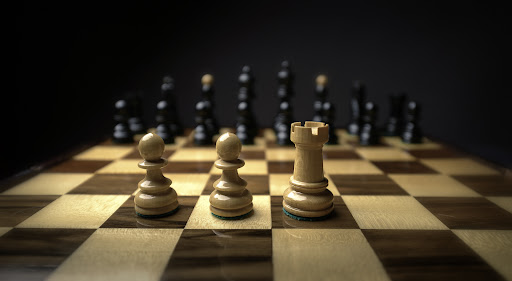Checkmate! Never too Late to join the Chess Club

Chess pieces on top of chess board. Photo Credit: Flickr
December 6, 2022
Just you, 64 squares, and 32 pieces on a checkered board. This is chess, a competitive board game of strategic skill for two players. The definition of chess in the Oxford Dictionary is when each player begins the game with sixteen pieces that are moved and used to capture the opposing pieces according to chess rules. The object is to put the opponent’s king under a direct attack from which escape is impossible (ending in a checkmate).
UACHS veteran mathematics teacher, Pinkus Pavlotskiy, is also the chess club advisor. Pavlotskiy is a professional on the subject and is a skilled player.
“I was first introduced to chess when I was six years old, my granddaughter was two, and my grandson was also six when they started playing, it is very hard to teach,” said Pavlotskiy.
Chess runs in the family, and from a young age, he gained experience and knowledge in this game. Now Pavlotskiy is sharing his knowledge with students. He sees the effort in students and helps them to realize their true potential.
“I can see that the kids who do play chess, especially in my geometry class, they are doing much better,” said Pavlotskiy. “You only have yourself and your mind.”
No matter what you are doing, chess can help everyone to be determined and use their imagination to solve many different problems in their life. Pavlotskiy is ensuring that you will be knowledgeable and skilled about chess even before playing. He makes sure that you are guided through the plays.
Chess has the same purpose as math. It trains your mind to answer questions quickly, efficiently, and effectively. The only difference is that chess has more complex questions after every move.
Junior, Sade Mayaki, who is in Pavlotskiy’s pre-Calculus class, is an active participant in the chess club. She is eager to learn and hopes to soon play chess. She hopes to master the game and not only have competition, but also find it essential to have fun.
I didn’t really have the assets or resources in my community growing up, so now that Pavlotskiy is teaching it, I took the opportunity and I joined,” said Mayaki. “We are always learning new plays and practicing, guaranteeing that we know all the rules before actually playing with a component.”
If you are interested in improving your critical thinking and learning how to maneuver through complex situations the chess club meets every Monday at 3 p.m.